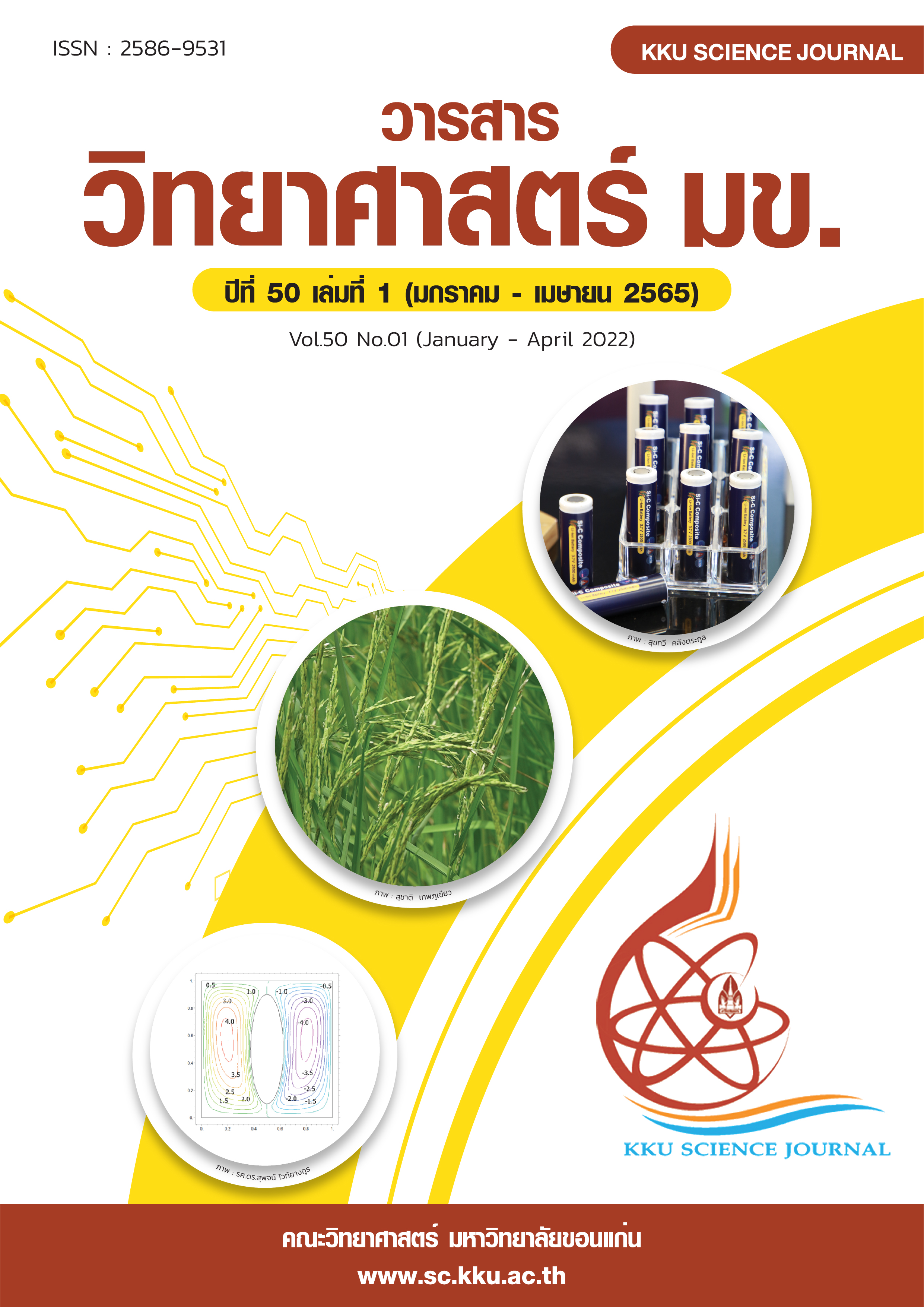ความเหมือนทางบุคลิกภาพกับประสิทธิภาพของทีมพัฒนาซอฟต์แวร์ กรณีศึกษา นิสิตสาขาวิชาวิศวกรรมซอฟต์แวร์
Main Article Content
บทคัดย่อ
การพัฒนาซอฟต์แวร์เป็นการพัฒนาโครงการซอฟต์แวร์ในรูปแบบทีม ทักษะการทำงานเป็นทีมจึงมีความสำคัญและจําเป็นสำหรับนักพัฒนาซอฟต์แวร์ในอนาคต ซึ่งการทำงานร่วมกันเป็นทีมจะประสบความสำเร็จในโครงการพัฒนาซอฟต์แวร์ได้ขึ้นอยู่กับความสามารถทั้ง 2 ด้านของนักพัฒนาซอฟต์แวร์คือ ทางด้านเทคนิค (Hard skills) และด้านบุคคล (Soft skills) โดยบุคลิกภาพเป็นส่วนหนึ่งของด้านบุคคล ถ้าสมาชิกในทีมเข้าใจถึงความเหมือนและแตกต่างของบุคลิกภาพของสมาชิกภายในทีมก็จะช่วยให้การทำงานร่วมกันมีประสิทธิภาพมากขึ้น ผู้วิจัยทำการศึกษาความเหมือนทางบุคลิกภาพของสมาชิกทีมมีผลต่อประสิทธิภาพการพัฒนาซอฟต์แวร์อย่างไร โดยเก็บรวบรวมข้อมูลบุคลิกภาพของนิสิตสาขาวิศวกรรมซอฟต์แวร์ชั้นปีที่ 3 ที่ทำงานร่วมกันเป็นทีมสกัม (Scrum) เป็นระยะเวลา 1 ปีจำนวน 147 คน แบ่งเป็นทีมๆ ละ 8 -10 คน จำนวน 16 ทีม วัดบุคลิกภาพด้วยแบบประเมินบุคลิกภาพ MBTI และวัดประสิทธิภาพของทีมจากคะแนนเฉลี่ยการพัฒนาซอฟต์แวร์ในแต่ละวงรอบทั้งหมด 4 วงรอบ ประกอบด้วย คะแนนประเมินกระบวนการในการพัฒนาซอฟต์แวร์ (Process) จำนวน 8 ประเด็นคะแนนเต็ม 40 คะแนน และคะแนนประเมินผลลัพธ์ของผลิตภัณฑ์ (Product) คะแนนเต็ม 10 คะแนน โดยผู้เชี่ยวชาญในการพัฒนาซอฟต์แวร์จำนวน 10 คน ผลการวิจัยพบว่า ความเหมือนทางบุคลิกภาพของบุคคลในทีมไม่มีผลต่อประสิทธิภาพการพัฒนาซอฟต์แวร์ทั้งการทำงานร่วมกันและคุณภาพของผลิตภัณฑ์ซอฟต์แวร์ถึงแม้ว่าผลการวิเคราะห์จะแสดงค่าความสัมพันธ์กันในเชิงบวกแต่ก็ไม่มีนัยสำคัญทางสถิติที่ 25 ระดับ 0.05
Article Details

อนุญาตภายใต้เงื่อนไข Creative Commons Attribution-NonCommercial-NoDerivatives 4.0 International License.
เอกสารอ้างอิง
Acuña, S.T., Gómez, M. and Juristo, N. (2009). How do personality, team processes and task characteristics relate to job satisfaction and software quality?. Information and Software Technology 51(3): 627-639.
Acuna, S.T., Gómez, M.N., Hannay, J.E., Juristo, N. and Pfahl, D. (2015). Are team personality and climate related to satisfaction and software quality? aggregating results from a twice replicated experiment. Information and Software Technology 57(1):141-156.
Bootzin, R.R., Bower, G.H., Crocker, J. and Hall N. (1991). Psychology Today an Introduction. (7th ed.). New York: McGraw-Hill.
Bradley, J.H. and Hebert, F.J. (1997). The effect of personality type on team performance. Journal of Management Development 16(5): 337-353.
Capretz, L.F. (2003). Personality types in software engineering. International Journal of Human-Computer Studies 58(2): 207-214.
Capretz, L.F. and Ahmed, F. (2010). Why do we need personality diversity in software engineering?. ACM SIGSOFT Software Engineering Notes 35(2): 1-11.
Chen, J., Qiu G., Yuan, L., Zhang, L. and Lu, G. (2011). Assessing Teamwork Performance in Software Engineering Education: A Case in a Software Engineering Undergraduate Course. In: 18th Asia- Pacific Software Engineering Conference. 17-24.
Chiaburu, D.S., Oh, I. S., Berry, C.M., Li, N. and Gardner, R.G. (2011). The Five-Factor Model of Personality Traits and Organizational Citizenship Behaviors: A Meta-Analysis. Journey of Amplified Psychology 96(6): 1140-1166.
Choi, K.S., Deek, F.P. and Im, I. (2008). Exploring the underlying aspects of pair programming: The impact of personality. Information and Software Technology. Information and Software Technology 50(11): 1114-1126.
Galpin, V.C., Sanders, I.D. and Chen, P. (2007). Learning styles and personality types of computer science students at a South African university. In: Proceedings of the 12th Annual SIGCSE Conference on Innovation and Technology in Computer Science Education-ITiCSE.
Gilal, A.R., Jaafar, J., Capretz, L.F., Omar, M., Basri S. and Aziz I.A. (2017). Finding an effective classification technique to develop a software team composition model. Journal of Software: Evolution and Process 29(10): 1-12.
John, O.P. and Srivastava, S. (1999). The Big Five Trait taxonomy: History, measurement, 306 and theoretical perspectives. In L. A. Pervin and O. P. John (Eds.), Handbook of personality: Theory and research. New York: Guilford Press. pp. 102–138.
Jung, C.G. (1923). Psychological types; or, The psychology of individuation. London: Paul, Trench, Trubner.
Karn J., Syed-Abdullah, S., Cowling, A.J. and Holcombe, M. (2007). A study into the effects of personality type and methodology on cohesion in software engineering teams. Behaviour and Information Technology 26(2): 99-111.
Lynch, A.Q. (1985). The Myers-Briggs Type Indicator: A tool for appreciating employee and client diversity. Journal of Employment Counseling 22(3): 104–109.
Myers, I.B., McCaulley, H.M., Quenk, N.L. and Hammer, A.L. (1998). MBTI Manual: A Guide to the Development and Use of the Myers Briggs Type Indicator. Soviet Union, USA: Consulting Psychologists Press.
Permana, P.A. (2015). Scrum Method Implementation in a Software Development Project Management. International Journal of Advanced Computer Science and Applica-tions 6(9): 198-204.
Peslak, A.R. (2006). The impact of personality on information technology team projects. In: Proceedings of the 2006 ACM SIGMIS CPR conference on computer personnel research: Forty four years of computer personnel research: achievements, challenges and the future. 273-279.
Pieterse, V. and Eekelen, M. van, (2016). Which Are Harder? Soft Skills or Hard Skills?. Springer International Publishing. 160-167.
Pieterse, V., Leeu M. and Eekenlen, M.V. (2018). How personality diversity influences team performance in student software engineering teams. In: 2018 Conference on Information Communications Technology and Society (ICTAS). 1-6.
Poonam, R. and Yasser, C.M. (2018). An experimental study to investigate personality traits on pair programming efficiency in extreme programming. In: 2018 5th International Conference on Industrial Engineering and Applications (ICIEA). 95-99.
Qamar, N. and Malik, A.A. (2019). Birds of a Feather Gel Together: Impact of Team Homogeneity on Software Quality and Team Productivity. IEEE Access 7: 96827-96840.
Serrador, P. and Pinto, J.K. (2015). Does agile work?: a quantitative analysis of agile project success. International Journal of Project Management 33(5): 1040-1051.
Shameem, M., Kumar, C. and Chandra, B. (2017). A proposed framework for effective software team performance: A mapping study between the team members personality and team climate. In: 2017 International Conference on Computing, Communication and Automation (ICCCA). 912-917.


